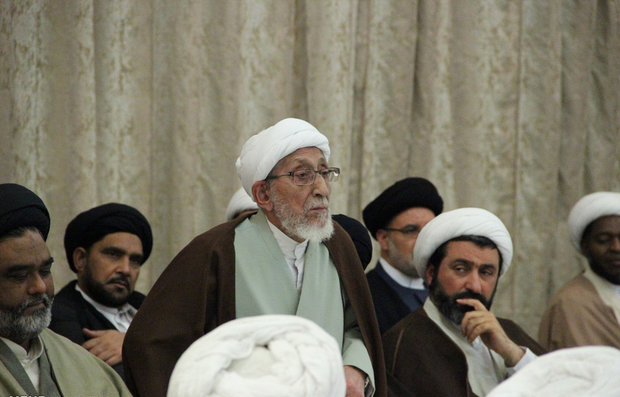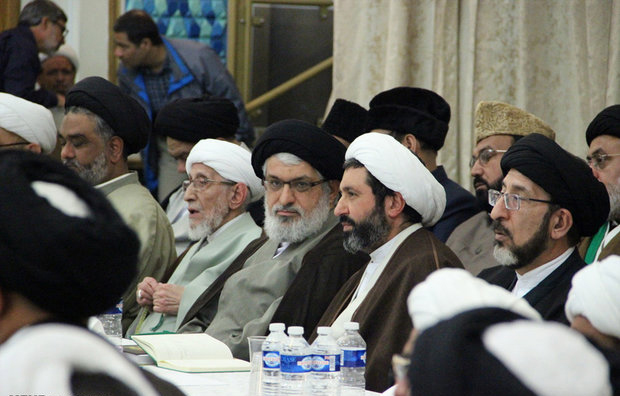The 25th annual meeting of UK Ulema (clergymen), community leaders and teachers, was held on 16 September, prior to the commencement of the month of Muharram and commemorations of the martyrdom of Imam Husayn(a). The title of the discussion was ‘the effective strategic approach in promoting Islam in the West‘.
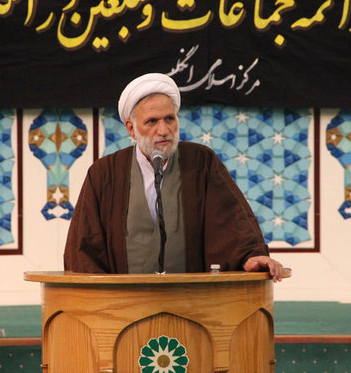 The first speaker, Hujjatulislam Sheikh Alemi, chairman of the Islamic Universal Association of London, considered the promotion of Islam as one of the fundamental concerns for scholars and clergymen. He highlighted the four strategic approaches as per the Qur’an and traditions of the Prophet as: the promotion of Islam itself; the characteristics of preachers; the content of the promotional material, and the method of preaching and its effectiveness.
The first speaker, Hujjatulislam Sheikh Alemi, chairman of the Islamic Universal Association of London, considered the promotion of Islam as one of the fundamental concerns for scholars and clergymen. He highlighted the four strategic approaches as per the Qur’an and traditions of the Prophet as: the promotion of Islam itself; the characteristics of preachers; the content of the promotional material, and the method of preaching and its effectiveness.
While stressing verses of the Qur’an, he explained that there are no better words to invite people to the path of God. He also underlined that the piety of the preacher is one of the most important factors and that this feature represent the character of every prophet, who all acted upon the message they preached.Furthermore, Sheikh Alemi said that speakers and preachers should be very cautious about their use of words. He also explained that the event of Ashura and the testimony of Imam Husayn(a) are a vast sea of resources that should be used in the promotion of Islam.
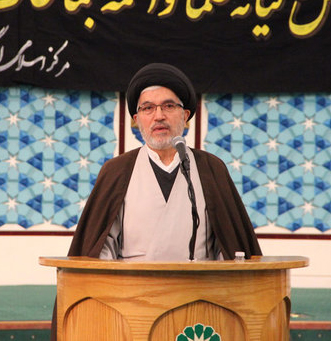 The next speaker Ayatollah Dr Sayyid Fadhel Al-Milani, said that considering all the challenges that the Muslims face today, especially in the West, meetings such as this are useful, as they can provide an opportunity to share each other’s experiences.
The next speaker Ayatollah Dr Sayyid Fadhel Al-Milani, said that considering all the challenges that the Muslims face today, especially in the West, meetings such as this are useful, as they can provide an opportunity to share each other’s experiences.
Undoubtedly, today’s most important challenge is Islamophobia, fuelled by a cruel and negative image of Islam that has been created in the West through the media. He explained that we should produce our discourse based on the necessities of time and place.
Dr Milani identified Muslim youth problems as another important subject among the Muslim communities in the West and stated that leaders and heads of communities have forgotten their duties towards the youth. “Youth’s problems range from addiction, heresy, immorality and disregard for social laws…” he said.
He underlined that the commemoration of the event of Ashura is a great opportunity to bring the message of Imam Husayn(a), which is; the promotion of good and forbidding the evil.
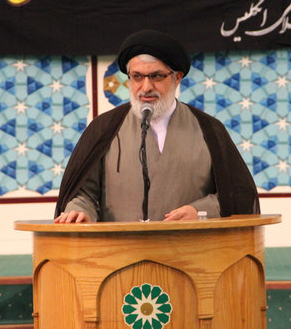 The meeting continued with the address of Hujjatulislam Seyyid Hashem Mousavi from Iran who conveyed the warm greetings of Ayatollah Khamenei to the audience and his wishes for the good health and success of all scholars and activists working in presenting the message of Islam.
The meeting continued with the address of Hujjatulislam Seyyid Hashem Mousavi from Iran who conveyed the warm greetings of Ayatollah Khamenei to the audience and his wishes for the good health and success of all scholars and activists working in presenting the message of Islam.
Hujjatulislam Mousavi highlighted the importance of understanding the audience when preaching Islam. Preachers must recognise the necessity of different strategies with regards to addressing the local population and others.
Hujjatulislam Mousavi requested that speakers, activists and preachers extend the area that they cover in presenting Islam and try to engage positively with natives of the countries in which they preach. He urged on offering new and up-to-date contributions in all areas, such as politics, women’s rights etc. He also pointed out that these should be presented in different formats, depending on the time and the place. With the approach of the month of Muharram and its commemorative programmes, scholars, preachers and head of communities should avoid division in their talks and should create unity and harmony with their messages while employing a coherent method and language.
The event continued with statements and suggestions from other scholars followed by a final address by Hujjatulislam Dr Mohammad Ali Shomali.
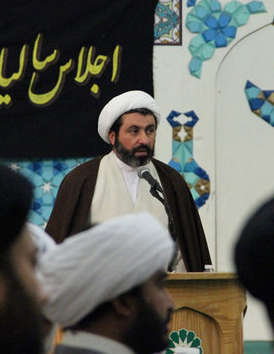 Dr Shomali, the head of the Islamic Centre of England, thanked the scholars for attending the meeting and stressed the importance of this gathering. He said that religious propagation is not only about making a speech or writing material but also making sure that the message reaches its intended audience.Today it is barely possible to find a book in major bookstores or in the public libraries that the Shi‘a Ulema have written about Shi‘ism. He compared this with the success of the propagation of e.g. Buddhism and said that presently there exist a large number of books in English about Buddhism in the market and considerable number of people in the West including famous or well educated people have become interested in Buddhism. This shows that Buddhism’s promotional message is reaching people’s hearts and minds.
Dr Shomali, the head of the Islamic Centre of England, thanked the scholars for attending the meeting and stressed the importance of this gathering. He said that religious propagation is not only about making a speech or writing material but also making sure that the message reaches its intended audience.Today it is barely possible to find a book in major bookstores or in the public libraries that the Shi‘a Ulema have written about Shi‘ism. He compared this with the success of the propagation of e.g. Buddhism and said that presently there exist a large number of books in English about Buddhism in the market and considerable number of people in the West including famous or well educated people have become interested in Buddhism. This shows that Buddhism’s promotional message is reaching people’s hearts and minds.
Hujjatulislam Dr Shomali explained that God’s message should be presented in such a way that attracts audiences and makes them feel that they can relate to it and they actually need it. He then considered two types of promotional strategies in the West and said that none should be sacrificed for the sake of the other. The first strategy is to work with the Muslim community in the West, in which we are still at the beginning. In this area, other religious and cultural minorities with a longer history are still suffering from secularisation and other problems. Although it will take many years to reach to their position, one should not ignore this fact, and we should make the young Muslims in general and Shi‘as in particular, proud without feeling belittled.
The other strategy is to work on building bridges and to promote dialogue and outreach programmes. Despite their theological differences, believers in God have common concerns and they should unite around the Common Word and work together. There are also areas that one may work with people of good will, even if they have no particular faith e.g. for preservation of environment.
The gathering ended with a recitation by Hujjatulislam Ali Borhan recalling the event of Karbala and the Day of Ashura.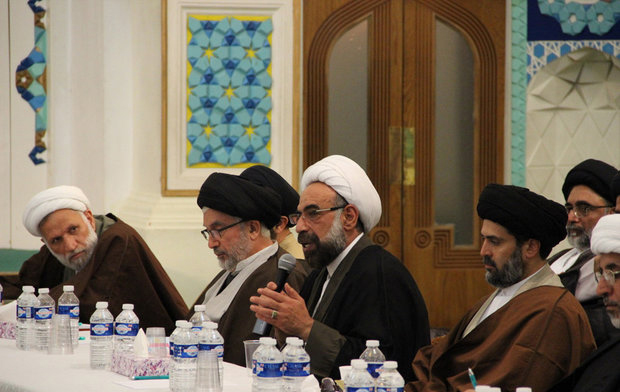
 Ijtihad Network Being Wise and Faithful Muslim in the Contemporary World
Ijtihad Network Being Wise and Faithful Muslim in the Contemporary World
